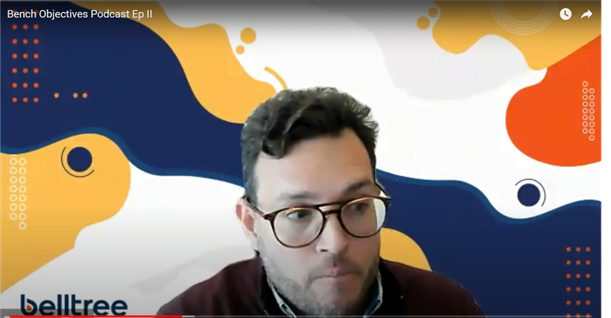Bench Objectives Podcast
Play
Grant: Eugenio, very good to speak to you again! Thank you so much for joining. You are our second guest on Bench Objectives. Would you be kind enough for our listeners to give a little bit about your background and perhaps your journey through oil and gas? From the early days to present day?
Eugenio: Definitely. First, thank you, Grant, for having me on this podcast. It’s a real pleasure. So, you already mentioned most of my experience. My background focuses on two key areas: production and reservoir engineering. My journey started sometime in the late ’90s. I began as a production engineer, working in operations in Oil and Gas. I started in Venezuela, then I moved to Argentina, and I’ve been involved in production engineering duties, supervising fields, and eventually transitioning to reservoir engineering. Initially, I focused on operational aspects and later moved towards software and modeling, leading teams to support design and field development plans, and optimizing recovery factors. I like to say that if you had to tag my experience, it would be as a “recovery factor chaser,” always seeking to maximize economic recovery from our fields and explore new technologies and techniques to meet society’s energy needs.
Grant: Fantastic. Thank you very much. It’s very insightful and quite clearly a very strong objective, which is completely aligned with our experience within Belltree. Hydrocarbon energy remains significant for the foreseeable future and should not be marginalized.
Let’s start the podcast. Data plays a crucial role in the oil and gas industry. How do you see data analytics impacting upstream performance and field development? Could you share a specific example of how improved data management leads to measurable improvements in reservoir simulation and production performance?
Eugenio: Certainly. Data analytics has a significant impact on various aspects from discovery to production and personnel management. It helps predict future outcomes, identify root causes, and informs decision-making processes. In field development, data analytics shortens project cycles by leveraging historical data to support more data-driven decision-making, ultimately enhancing business performance. It’s about maximizing production time and delivering more energy to society. We utilize data analytics to run numerous models and recommend the best representations for field development. Over the last decade, the application of data has become more sophisticated, moving towards prescriptive analytics, where data recommends actions, similar to targeted marketing strategies on our phones. Companies are gradually adopting these approaches to enhance operational efficiency and maximize value over time.
Grant: Indeed, the forecast-driven approach seems essential for the industry’s future. Regarding benchmarking studies, how does oil and gas benchmarking differ from traditional approaches to reservoir management? Why do you think it’s gaining traction in the industry now?
Eugenio: Benchmarking has traditionally been used to compare performance against industry standards, triggering actions based on deviations. However, the focus is shifting towards using benchmarks to recommend actions for achieving expected results. For instance, comparing a gas field with a lower recovery factor against a benchmark of higher-performing fields prompts a detailed analysis to identify potential action plans to close the gap. This approach accelerates decision-making and optimizes resource allocation, emphasizing value-driven decisions rather than solely analyzing data.
Grant: I think forecasting ahead makes sense for the industry’s progress. Regarding data collection challenges, what common challenges have you encountered at Repsol, and how did you overcome them?
Eugenio: Manual data collection poses significant challenges, especially when integrating analogue data from older systems. We’ve transitioned towards sensor-based data collection, leveraging advancements in sensor technology and computing power. This shift has revolutionized data collection, enabling more accurate and efficient data analysis, ultimately enhancing operational effectiveness.
The second challenge lies in eliminating human errors in data recording. We established protocols for sensor maintenance, ensuring accurate data collection. Transitioning from analogue to digital data storage posed initial challenges, but cloud computing has since streamlined data management. We began capitalizing on data analytics around 2017, using models to detect anomalies and optimize operations. While we’ve made significant progress, we continue to explore data analytics’ full potential.
In the upstream sector, leveraging analogue data requires integration with digital datasets. Our archives are now digitized, accessible, and algorithmically searchable, facilitating quick access to valuable information. As we strive to reduce project cycle times, predictive analytics and decision support systems are becoming vital. We aim to not only identify problems but also recommend actionable solutions, ultimately enhancing operational efficiency.
Regarding industry trends, the widespread adoption of data analytics is reshaping workflows and skill requirements across organizations. Incorporating data analytics skills is now imperative for all team members, from engineers to financial analysts. Harnessing the full potential of data analytics will drive efficiency and innovation in the industry.
As we conclude, the key takeaway is to embrace data analytics as a cornerstone of decision-making processes. By leveraging data effectively, organizations can optimize performance and drive impactful change in the industry.
Grant: It’s very good to have a reinforcement like that, certainly from our business. And how we have evolved data, analysts and data scientists are becoming more and more prevalent and necessary to, as you see, and the theme throughout the discussion today, we produce two things within industry, hydrocarbon and data, and it’s what you do with that data.
So I think on that note, I’d like to thank you very much indeed for all your insight. And perspective, and hopefully that will be inspiring to individuals out there in the listening world. So thank you so much indeed Eugenio. Pleasure, absolute pleasure.
If anyone’s interested in our bMark or Belltree’s bMark software, you can certainly arrange a demonstration of the product via www. belltreegroup.co.uk. But in closing, please stay tuned for more engaging discussions throughout this year. Thank you so much. Goodbye.



